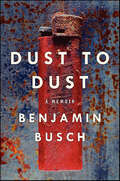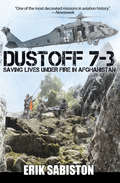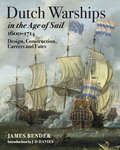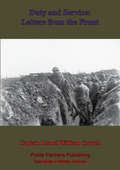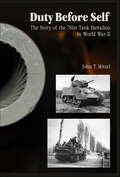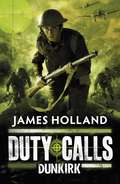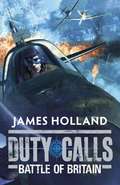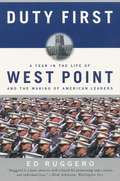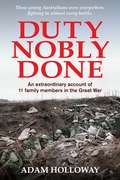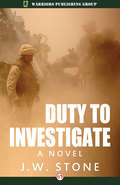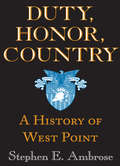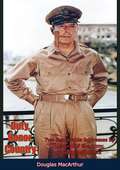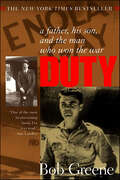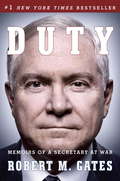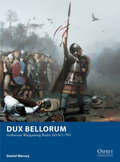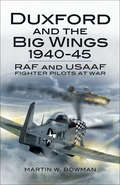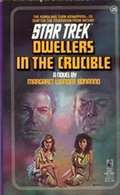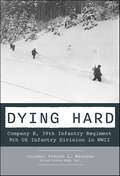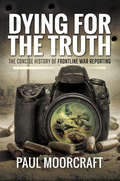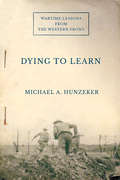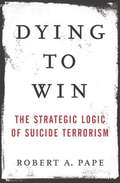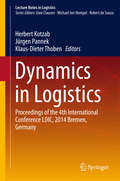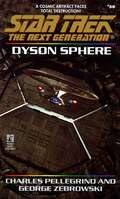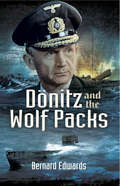- Table View
- List View
Dust to Dust: A Memoir
by Benjamin Busch“A wonderful book, original in concept and stunningly written.”—Ward Just“Elegiac, funny, wistful, deep, and wonderfully human, Dust to Dust moved me to laughter and tears, sometimes simultaneously.”—Karl Marlantes, bestselling author of Matterhorn and What It Is Like to Go to WarTim O’Brien meets Annie Dillard in this remarkable memoir by debut author Benjamin Busch. Much more than a war memoir, Dust to Dust brilliantly explores the passage through a lifetime—a moving meditation on life and death, the adventures of childhood and revelations of adulthood. Seemingly ordinary things take on a breathtaking radiance when examined by this decorated Marine officer—veteran of two combat tours in Iraq—actor on the hit HBO series The Wire, and son of acclaimed novelist Frederick Busch. Above all, Benjamin Busch is a truly extraordinary new literary talent as evidenced by his exemplary debut, Dust to Dust—an original, emotionally powerful, and surprisingly refreshing take on an American soldier’s story.
Dustoff 7-3: Saving Lives Under Fire in Afghanistan
by Erik SabistonDustoff 7-3 tells the true story of four unlikely heroes in the rugged mountains of Afghanistan, where medics are forced to descend on wires to reach the wounded and helicopter pilots must fight wind, weather, and enemy fire to pluck casualties from some of the world's most difficult combat arenas. Complete opposites thrown together, cut off, and outnumbered, Chief Warrant Officer Erik Sabiston and his flight crew answered the call in a race against time, not to take lives--but to save them. The concept of evacuating wounded soldiers by helicopter developed in the Korean War and became a staple during the war in Vietnam where heroic, unarmed chopper crews flew vital missions known to the grateful grunts on the ground as Dustoffs. The crew of Dustoff 7-3 carried on that heroic tradition, flying over a region that had seen scores of American casualties, known among veterans as the Valley of Death. At the end of Operation Hammer Down, they had rescued 14 soldiers, made three critical supply runs, recovered two soldiers killed in action, and nearly died. It took all of three days.
Dutch Warships in the Age of Sail, 1600–1714: Design, Construction, Careers and Fates
by James BenderThis definitive study presents a complete account of the Dutch Republic&’s naval fleet during its golden age as a world power. The Netherlands was by far the most important maritime power of the seventeenth century. It dominated seaborne trade with the largest merchant fleet in the world. Born out of an 80-year struggle against Spain for independence, the Dutch republic relied on naval power to protect its freedom, promote its trade and defend its overseas colonies. Yet the ships that made up its fleets are among the least studied of any in the age of sail. This is partly because a decentralized administration of five separate admiralties, often producing ships of the same name at the same time, as well as competing systems of measuring ships, all lead to confusion and error. In this comprehensive volume, James Bander delivers the first definitive listing of all Dutch fighting ships—whether purpose-built, purchased, hired or captured—from the heyday of the United Provinces. Each entry is complete with technical details and summaries of the ship&’s career. It also provides administrative, economic and technical background, and outlines the many campaigns fought by one of the most successful navies in history.
Duty And Service: Letters From The Front.
by Captain Lionel William CrouchCaptain Crouch had served in the Territorial Army for some years before the cataclysmic struggle in Europe began in 1914. Unlike all the other belligerent parties, Britain did not, and still does not, have standing military conscription; the Regular Army of full-time highly trained volunteers provide the first line soldiers. Bolstering the first line soldiers were the part-time volunteers of the Territorial Army, providing additional manpower and more limited service. However, during both World Wars the men of the Territorial Army were in dire necessity of the time pressed forward into the line as fighting divisions, the men eager to bring the fight to the enemy.Our Author's war time service in the Oxford and Buckinghamshire Light Infantry started the moment that war broke out, from August 1914 to March 1915; he and his men trained to reach a peak of efficiency. This moment could not come too soon: the first seven divisions of the Regular Army that had formed the initial expeditionary forces had ceased to exist in the face of overwhelming number of the enemy. The Territorials and other Reserve forces from all over the British empire rushed to France and were plunged into the thick of the fighting amongst the trenches.Captain Crouch's letters form an unbroken stream between the mobilization, and are in equal part illuminating and evocative of the life of a young man who fell in service to his country. Although place-names were omitted from his letters due to censorship of the time , he was interred at Pozières British Cemetery, Ovillers-La Boisselle, meaning that he probably fell in this area during the battle of the Somme.An engaging read.Author -- Captain Lionel William Crouch (1886-1916)Text taken, whole and complete, from the edition published for private circulation 1917.Original Page Count - 158 pages.
Duty Before Self: The Story of the 781st Tank Battalion in World War II
by John T. MitzelIn January 1943, and as World War II entered its second year it was evident that U.S. tanks were outgunned, under-armored, and underpowered. In short, they weren't cutting the mustard, but there was no time for a long development project. At Fort Knox, Kentucky, the newly-formed 781st Tank Battalion was detailed to run an around-the-clock marathon comparison test on forty Sherman tanks to find the best available configuration and fastest solution. When the results of the "Million Dollar Tank Test" were collected, what resulted was the Sherman "Easy Eight," an easier to manufacture tank that was also such an effective fighting vehicle that it would serve for another thirty years. The 781st Tank Battalion shipped out to Europe, where, equipped with the "Easy Eight," it thwarted Hitler’s last major offensive in the West – Operation Nordwind – and swept southern Germany as the tip of the U.S. Seventh Army’s sword.
Duty Calls: Dunkirk (Duty Calls)
by James Holland'YOU WANTED TO SEE SOME ACTION - WELL YOU'RE GOING TO GET IT NOW. YOU'RE GOING TO GET IT NOW ALL RIGHT.'Friday 24th May, 1940Private Johnny Hawke, aged sixteen, awakens to artillery fire.Hours later, Stukas scream down from the sky. Messerschmit fighters roar towards his regiment. Trucks burst into flames.Now men and mules lay dead and dying, severed limbs twisted grotesquely as blood soaks the cobbled streets.Young Private Hawke just wants to do his duty and serve his country. But as he - and his fellow soldiers - prepare to stop the German advance, there's only one question on everyone's lips.HOW WILL THEY SURVIVE?
Duty Calls: World War 2 Fiction (Duty Calls)
by James HollandPilot officer Archie Jackson, 19, is in control of the RAF's newest fighter aircraft, a Supermarine Spitfire.Now he has the Luftwaffe in his sights and only one thing matters: defending Britain. Suddenly planes are falling from the sky, exploding and spiralling into the English Channel.France has fallen and the swastika flies over Occupied Europe. Only these young pilots - barely out of boyhood - stand between Britain and a Nazi invasion . . . Duty Calls: Battle of Britain, throws you deep into the heart - and horror - of Britain's darkest, and finest, hour.** Historian James Holland is the bestselling author of the Jack Tanner adult war fiction books. Duty Calls is his first series for younger readers, and showcases his expertise on the Second World War. ** James Holland presented Battle of Britain: The Real Story on BBC2.
Duty First
by Ed RuggeroDuty First is a penetrating account of a year inside one of America's premier schools for leadership -- the United States Military Academy -- as it celebrates the bicentennial of its founding. Ed Ruggero, a former West Point cadet and professor, takes an incisive look at how this elite school builds the "leaders of character" who will command the nation's military. Writing with deep insight and superb narrative skill, Ruggero follows the cadet's tumultuous lives: the initial grueling training; the strict student hierarchy and intense classroom work; and the interaction between the lowly first-year plebes and the upper-class cadets who train them. Duty First also shows the role played by the majors, captains, and sergeants, who oversee everything that happens at this unique institution.
Duty Nobly Done: An Extraordinary Account of 11 Family Members in the Great War
by Adam HollowayThis is the extraordinary true story of 11 young Australian men from one extended family and their experiences in the great adventure that would change their lives — the Great War. Author Adam Holloway, a direct descendant, takes the reader into the lives of each of these men as they embark on a journey from which they are unlikely to return. These were young, confident men who revelled in the brash optimism of a young nation. They were desperate to prove themselves, eager to assert the justice of their cause and keen for a taste of the excitement and comradeship of battle. They were not expecting to be plunged into a lingering nightmare characterised by the stench of death and putrefaction, overwhelming fear and despair, and the gnawing uncertainty of survival. Holloway uses personal letters, diaries and family memories to deftly recreate the nail-biting tension as each man experiences his own baptism of fire amid the utter horror of the sights and sounds of battle. From the craggy cliffs of Gallipoli to the insatiable maw of the Western Front, these brothers and cousins step forward to take their turn in a procession of courage, each determined to do his duty and to look after his battalion brothers. This is a story that portrays the Great War on a personal level, describing in remarkable detail how it felt to fight in the worst conflict the world had known, a conflict that would change these young men and Australian society forever.
Duty to Investigate: A Novel
by J. W. StoneAs a successful trial lawyer, Mike Beck uses his personality and his skill with the letter of the law to win in a courtroom. As a marine reservist ordered to Iraq on an unexpected deployment, he finds himself in a different world where the law of war often conflicts with common sense and his own feel for what's right and what's wrong.When an embedded female correspondent reveals what appears to be an illegal killing of Iraqi civilians by a US marine during the battle for Fallujah, Beck finds himself faced with a case that challenges both his legal skills and his conviction that something is very wrong with what seems to be a clear violation of the law of land warfare. Devoted to finding the truth about an ugly incident and keeping an innocent marine from being convicted in a court-martial, Mike Beck defies orders, purloins evidence, and leads a combat team that must fight its way through a fanatical enemy force to investigate the scene of the alleged crime.Along the way as he battles his conscience, command influence, and a media giant clamoring for his head, Mike Beck finds a lot of truth about the case, about the brutal enemy in Iraq, about the nature of a very nasty war, about the marines risking their lives in a confusing combat situation--and about himself as a marine, a lawyer, and a man.
Duty, Honor, Country: A History of West Point
by Stephen E. AmbroseA New York Times bestselling author writes about West Point.This new paperback edition of Stephen E. Ambrose's highly regarded history of the United States Military Academy features the original foreword by Dwight D. Eisenhower and a new afterword by former West Point superintendent Andrew J. Goodpaster.
Duty, Honor, Country: Two Memorable Addresses by General of the Army, Douglas MacArthur
by Douglas MacArthurThe present volume, first published in 1962, consists of two distinguished speeches given by the General of the U.S. Army, Douglas MacArthur.The first address took place on April 19, 1951 and was held before a joint meeting of the two houses of United States Congress—the House of Representatives and the Senate—and took place in the Hall of the House of Representatives. This meeting followed on just one week from MacArthur’s removal from command by President Harry S. Truman.The second address was held on May 12, 1921 and was given to The Members of the Association of Graduates, U.S.M.A., The Corps of Cadets, and Distinguished Guests. It was given on the occasion of MacArthur’s acceptance of the Sylvanus Thayer Award for outstanding service to the nation, which had gone to Eisenhower the year before. The event was held at the United States Military Academy in West Point, New York.
Duty: A Father, His Son, and the Man Who Won the War
by Bob GreeneWhen Bob Greene went home to central Ohio to be with his dying father, it set off a chain of events that led him to knowing his dad in a way he never had before—thanks to a quiet man who lived just a few miles away, a man who had changed the history of the world.Greene's father—a soldier with an infantry division in World War II—often spoke of seeing the man around town. All but anonymous even in his own city, carefully maintaining his privacy, this man, Greene's father would point out to him, had "won the war." He was Paul Tibbets. At the age of twenty-nine, at the request of his country, Tibbets assembled a secret team of 1,800 American soldiers to carry out the single most violent act in the history of mankind. In 1945 Tibbets piloted a plane—which he called Enola Gay, after his mother—to the Japanese city of Hiroshima, where he dropped the atomic bomb.On the morning after the last meal he ever ate with his father, Greene went to meet Tibbets. What developed was an unlikely friendship that allowed Greene to discover things about his father, and his father's generation of soldiers, that he never fully understood before. Duty is the story of three lives connected by history, proximity, and blood; indeed, it is many stories, intimate and achingly personal as well as deeply historic. In one soldier's memory of a mission that transformed the world—and in a son's last attempt to grasp his father's ingrained sense of honor and duty—lies a powerful tribute to the ordinary heroes of an extraordinary time in American life.What Greene came away with is found history and found poetry—a profoundly moving work that offers a vividly new perspective on responsibility, empathy, and love. It is an exploration of and response to the concept of duty as it once was and always should be: quiet and from the heart. On every page you can hear the whisper of a generation and its children bidding each other farewell.
Duty: Memoirs of a Secretary at War
by Robert M GatesFrom the former secretary of defense, a strikingly candid, vivid account of serving Presidents George W. Bush and Barack Obama during the wars in Iraq and Afghanistan. When Robert M. Gates received a call from the White House, he thought he'd long left Washington politics behind: After working for six presidents in both the CIA and the National Security Council, he was happily serving as president of Texas A&M University. But when he was asked to help a nation mired in two wars and to aid the troops doing the fighting, he answered what he felt was the call of duty.
Dux Bellorum # Arthurian Wargaming Rules AD367-793
by Daniel Mersey Jose PenaThe Dark Age of Britain, from the middle of the 4th century to the end of the 8th, was a time of violence and warfare, when charismatic warlords such as the fabled King Arthur could gather together armies and carve out their own kingdoms. With this new set of wargames rules, players can take on the role of these warlords and command their own armies on the tabletop. Written by the author of the popular Glutter of Ravens rules set, Dux Bellorum is an element-based system, where each base of figures represents 50 fighting men. Each player has a specific number of points with which to construct his force and can choose a Late Roman, Romano-British, Welsh, Saxon, Pictish, Irish, or Sea Raider army, amongst others. The game is then played out following a set of simple, fast-paced rules. A completely self-contained gaming system, Dux Bellorum is perfect for gamers who are looking for a way into fighting Dark Age battles without investing a lot of time or money in larger rulesets.
Duxford and the Big Wings, 1940–45: RAF and USAAF Fighter Pilots at War
by Martin W. BowmanA pulsating account of the young RAF and American fighter boys who flew Spitfires, Hurricanes, Thunderbolts and Mustangs during 1940-45. It is unique in that the story is told using first person accounts from RAF, German and American Eagles who fought in the skies over England in the Battle of Britain in the summer of 1940 and the great air offensives over occupied-Europe from 1942 onwards. The first five and a half chapters cover the Battle of Britain period when the RAF squadrons fought dog fights with the Luftwaffe and then fought them in gathering strength using the Big Wings to meet the bomber fleets attacking London. The second part of the book covers the Eagle squadron period, which was expanded with Americas entry into the war. The action moves to the USAAF Big Wings of Thunderbolts and Mustang fighters that flew escort missions and dueled with the Luftwaffe over the continent during the massive bomber raids on German targets in France, the Low Countries and the Reich itself. A whole host of incredible first hand accounts by British, Polish, Czech, German and American fighter pilots permeate the action and describe the aerial battles as only they can. This unique book also includes many accounts and photos that have not previously been seen before while the rich mix of combat accounts from all sides are brought together for the first time in one volume.
Dwellers in the Crucible (Star Trek: The Original Series #25)
by Margaret Wander BonannoDWELLERS IN THE CRUCIBLE Warrantors of Peace: the Federation's daring experiment to prevent war among its members. each Warrantor, man or woman is hostage for the government of his native world -- and is instantly killed if that world breaks the peace. Now Romulans have kidnapped six Warrantors, to foment political chaos -- and then civil war -- within the Federation. Captain Kirk must send Sulu to infiltrate Romulan territory, find the hostages, and bring them back alive -- before the Federation self-destructs!
Dying Hard: Company B, 39th Infantry Regiment, 9th US Infantry Division in WWII
by French L. MacLeanOf the 177 enlisted men who formed Company B in 1941, less than 7% percent were still with the unit in May 1945. Many of the absent 93% had died hard, brutal deaths in combat. In the mold of the classic Band of Brothers, Colonel French MacLean presents a dramatic, personalized history of a single company of the US Army through brutal combat in battles at locations such as Normandy, the Ardennes and Hürtgen Forests, Merode Castle, and Remagen Bridge. This is the story of the 9th Division's 39th Infantry Regiment, Company B, a true American melting pot of soldiers from diverse ethnic, religious, racial, and national backgrounds, including Black, Hispanic, White, Mexican, Lakota, Quechan, Canadian, Cuban, Hungarian, Austrian, Norwegian, Scottish, Korean, Filipino, Chinese, Italian, Irish, Greek, Polish, Jewish, Catholic, and Protestant. Of the 177 enlisted men who formed Company B in 1941, less than 7% percent were still with the unit in May 1945. Many of the 93% whose lives were lost died hard, brutal deaths in combat. Readers will learn about the heritage, upbringing, and experiences of individual soldiers along with the history of the unit. This is a personal, dramatic history. Numerous "vignettes" appear throughout the text, which provide contextual information about equipment, terminology, locations, and more. They function like a glossary, but with greater detail and narrative effect. In total, 40 photos and 10 maps are included, most of which are previously unpublished. French MacLean is a retired colonel in the US Army and author of more than a dozen books on the Second World War; he is a recognized expert and experienced researcher. His father, Myron, served as a private in Company B.
Dying for the Truth: The Concise History of Frontline War Reporting
by Paul MoorcraftThe role of war correspondents is crucial to democracy and the publics discovery of the truth. Without them, the temptation to manipulate events with propaganda would be irresistible to politicians of all hues.It starts by examining how journalists have plied their trade over the years most particularly from the Crimean War onwards. Their impact on the conduct of war has been profound and the author, an experienced journalist, explains in his frank and readable manner how this influence has shaped the actions of politicians and military commanders. By the same token the media is a potentially valuable tool to those in authority and this two-way relationship is examined.Technical developments and 24 hour news have inevitably changed the nature of war reporting and their political masters ignore this at their peril and the author examines the key milestones on this road.Using his own and others experiences in recent conflicts, be they Korea, Falklands, Balkans, Iraq or Afghanistan, the author opens the readers eyes to an aspect of warfare that is all too often overlooked but can be crucial to the outcome. The publics attitude to the day-to-day conduct of war is becoming ever more significant and this fascinating book examines why.
Dying to Learn: Wartime Lessons from the Western Front (Cornell Studies in Security Affairs)
by Michael A. HunzekerIn Dying to Learn, Michael Hunzeker develops a novel theory to explain how wartime militaries learn. He focuses on the Western Front, which witnessed three great-power armies struggle to cope with deadlock throughout the First World War, as the British, French, and German armies all pursued the same solutions-assault tactics, combined arms, and elastic defense in depth. By the end of the war, only the German army managed to develop and implement a set of revolutionary offensive, defensive, and combined arms doctrines that in hindsight represented the best way to fight.Hunzeker identifies three organizational variables that determine how fighting militaries generate new ideas, distinguish good ones from bad ones, and implement the best of them across the entire organization. These factors are: the degree to which leadership delegates authority on the battlefield; how effectively the organization retains control over soldier and officer training; and whether or not the military possesses an independent doctrinal assessment mechanism.Through careful study of the British, French, and German experiences in the First World War, Dying to Learn provides a model that shows how a resolute focus on analysis, command, and training can help prepare modern militaries for adapting amidst high-intensity warfare in an age of revolutionary technological change.
Dying to Win: The Strategic Logic of Suicidal Terrorism
by Robert A. PapeIn the most comprehensive survey of suicide terrorism ever undertaken, Professor Robert Pape has collected details of every attack from 1980 to 2003, from Arabic, Hebrew, Tamil, and Russian language sources (as well as English), including primary documents from the suicide terrorist groups themselves. This comprehensive information provides a startling new window into the origins, conduct, and consequences of suicide terrorism.
Dynamics in Logistics
by Jürgen Pannek Herbert Kotzab Michael FreitagThese proceedings contain research papers presented at the 5th International Conference on Dynamics in Logistics, held in Bremen, Germany, February 2016. The conference is concerned with dynamic aspects of logistic processes and networks. The spectrum of topics reaches from modeling, planning and control of processes over supply chain management and maritime logistics to innovative technologies and robotic applications for cyber-physical production and logistic systems. The growing dynamic confronts the area of logistics with completely new challenges: it must become possible to describe, identify and analyze the process changes. Moreover, logistic processes and networks must be redevised to be rapidly and flexibly adaptable to continuously changing conditions. The book primarily addresses researchers and practitioners from the field of industrial engineering and logistics, but it may also be beneficial for graduate students.
Dynamics in Logistics
by Jürgen Pannek Herbert Kotzab Klaus-Dieter ThobenThis contributed volume brings together research papers presented at the 4th International Conference on Dynamics in Logistics, held in Bremen, Germany in February 2014. The conference focused on the identification, analysis and description of the dynamics of logistics processes and networks. Topics covered range from the modeling and planning of processes, to innovative methods like autonomous control and knowledge management, to the latest technologies provided by radio frequency identification, mobile communication, and networking. The growing dynamic poses wholly new challenges: logistics processes and networks must be(come) able to rapidly and flexibly adapt to constantly changing conditions. The book primarily addresses the needs of researchers and practitioners from the field of logistics, but will also be beneficial for graduate students.
Dyson Sphere: Star Trek The Next Generation (Star Trek: The Next Generation #50)
by George Zebrowski Charles PellegrinoTwo hundred million kilometers across, with a surface area that exceeds that of a quarter-billion worlds, the Dyson sphere is one of the most astounding discoveries the Federation has ever made. Now the U.S.S. Enterprise has returned to explore the awesome mysteries of the sphere. Intrigued by what is possibly the greatest archaeological treasure of all time, Captain Jean-Luc Picard hopes to discover the origin of humanoid life throughout the galaxy -- or perhaps the ultimate secret of the Borg. But when a neutron star approaches on a collision course with the sphere, a mission of discovery becomes a desperate race against time. The many sentient species inhabiting the sphere face extinction -- can even the Starship Enterprise save them all?
Dönitz and the Wolf Packs: The U-boats At War (Military Classics)
by Bernard EdwardsOn 17 September 1942 Admiral Karl Donitz, C-in-C U-boats, issued the following directive:To all Commanders - 'All attempts to rescue members of ships sunk, therefore also fishing out swimmers and putting them into lifeboats, righting capsized lifeboats, handing out provisions and water, have to cease. Rescue contradicts the most fundamental demands of war for the annihilation of enemy ships and crews'.This order ended what had hitherto been a war in which the opposing factions treated each other with a certain respect, seaman to seaman, showing mercy where mercy was due. It also marked the point at which the Battle of the Atlantic became a dirty war of attrition, with the U-boats hunting in packs snarling and snapping at the heels of the hard-pressed convoys. Ships began to go down like corn before the reaper, men were dying in their hundreds in the cold grey waters of the great ocean. This was a battle without quarter. A battle the U-boats would have won had it not been for the grit and determination of the convoy escorts and the unflagging resilience of the men who manned the vulnerable merchant ships.This book faithfully records the progress of the Battle of the Atlantic, which began within hours of the declaration of war on 3 September 1939 and continued without let-up until the last torpedo was fired on the night of 7 May 1945, just one hour before Germany surrendered. The story is told from both sides of the periscope.
